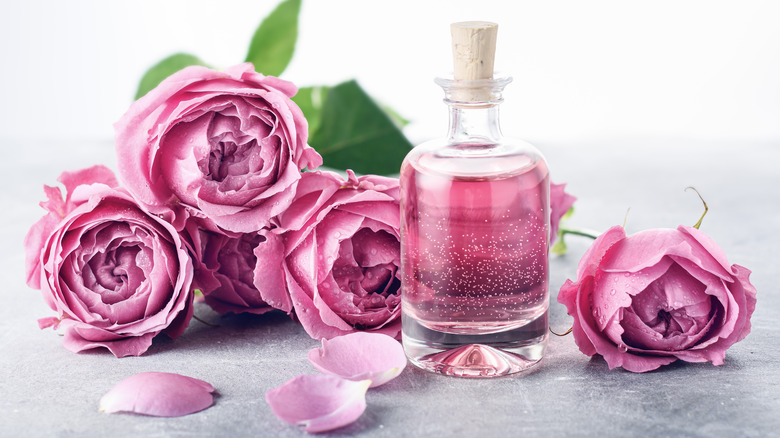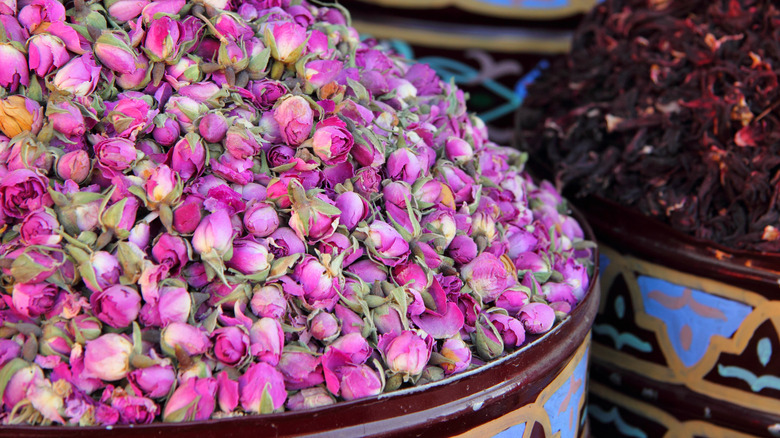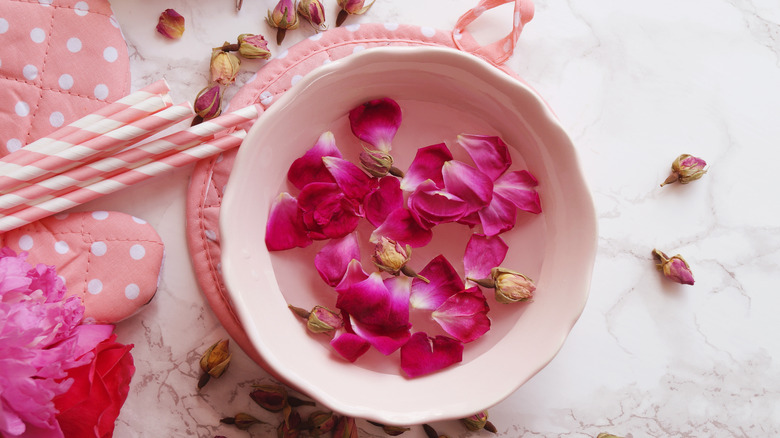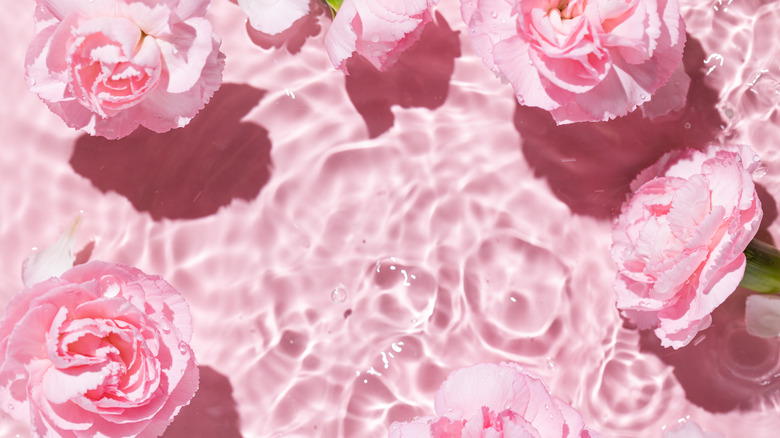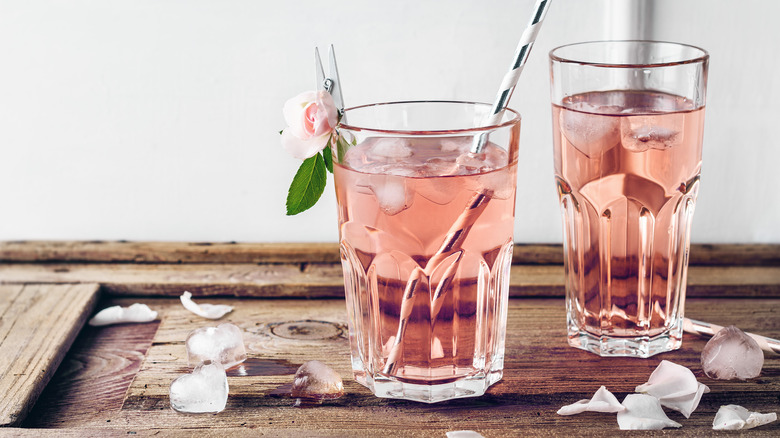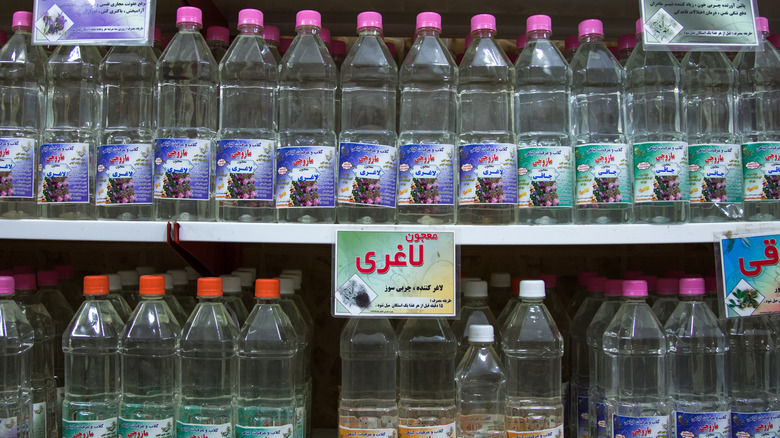The Water To Keep In Your Pantry For Middle Eastern-Inspired Cooking
We may receive a commission on purchases made from links.
When most people think of Middle Eastern cuisine, the most common foods that come to mind are things like hummus, pita bread, and falafel. While each is delicious in its own right, the region has much more to explore. From unique Middle Eastern condiments made from pickled mango, to famous spice blends of the likes of Ras el Hanout, Middle Eastern cuisine can be deceptively simple in appearance and bold in flavor. That's usually due to its use of lavish herbs and spices — one of the most common being rose.
In Middle Eastern cuisine, rose petals are often dried and ground into powder, where they're either used as a spice on their own or mixed into spice blends. They can often be found stirred into grains, made into a sweet, floral tea, or used as a garnish in many Middle Eastern desserts. But, to give any food that true rose essence from within, Middle Eastern cooks are known to use roses in a different form: water. Fragrant and flavored, rose water is the ingredient you need in your pantry for Middle Eastern-inspired cooking.
Culinary history of rose water
Used in perfume, cosmetics, and medicine for centuries, rose water has had a long line of uses throughout human history — but in the Middle East, at least, rose water is most known for its culinary purposes. It was first used as a seasoning mixed with mutton fat by ancient Persians, who also invented marzipan, a soft candy traditionally made from a mixture of almonds, sugar, and rose water. Most of rose water's earliest known recipes date back as early as the eighth century A.D., during the height of the Arab Empire.
Ancient Arabs began using it in everything from savory dishes to desserts. Then, as Islamic culture began to migrate to the East, rose water also became a popular seasoning in Indian cuisine. It is perhaps most famously used in the traditional Indian dish known as biryani but is also sometimes found added to lassi, a sweet yogurt drink that is commonly consumed after meals. Competing in notoriety is Turkish delight, which, dating back nearly 500 years, is also traditionally flavored with rose water.
It wasn't until the 19th century that rose water made its way West, where it essentially became to baking what vanilla extract is today. These days, rose and vanilla are often used in conjunction to one another, as the aromatics of the rose water add lightness to the warmth of the vanilla.
How is rose water made?
Rose water is a clear liquid made one of two ways: either by steeping rose petals in water or distilling them with steam. It originated as a result of making rose perfume, which was made by steam distilling rose petals to extract their essential oils. Rose water that's made this way is very robust and will last an impressively long amount of time in your pantry when it's stored correctly. However, it's not found quite as common in stores.
Most of the rose water that you will find in stores will have been made by either steeping the fresh or dried rose petals or mixing distilled water with rose oil. While these may not have as potent of flavor compared to the steam-distilled rose water, they will still add a nice amount of rose fragrance and flavor to your food and drinks.
While it's easy and relatively affordable to find in-store, it is possible to make your own rose water at home — just know that it won't last as long as the conventional bottles you'd buy. All you need is food-grade rose petals and a pot of distilled water. Boil them until the petals lose their color, strain them, and you'll have yourself a batch of fresh water to use for the next few months.
What does rose water taste like?
As you might expect, rose water tastes a lot like the flower itself. It adds a light, sweet, and floral taste to whatever you want — whether that be a cocktail, mahalabia (rose water pudding), or harissa chicken. While it may be more commonly used in sweet pairings, the sweet and floral rose notes pair well with savory spices like cardamom, coriander, cumin, saffron, and ginger. In fact, rose is often included in blends of Ras el Hanout, which is used in everything from lamb stews to rice and potatoes.
In Middle Eastern, South Asian, and Mediterranean cuisines, it's commonly paired with desserts that include nuts, whether they be pistachios or almonds, and fruits like oranges and lemons. It's perhaps most famous for its use in desserts like baklava and Persian rice pudding. Still, it can also be found in other traditional Middle Eastern sweets as its floral notes are known to be both relaxing and awakening.
How to cook with rose water
Elegant and clarifying, rose water is used both to add a floral aroma to sweets and to balance out intense savory spices. Although it can be added to most dishes and drinks, it must be used diligently. Too much rose water can easily overpower a dish, and you'll see the most success if you stick to the mentality that a little goes a long way.
When it comes to baked goods, in which rose water is almost always used along with vanilla, you can use up to a tablespoon of rose water to bring that floral essence through. For things like fruit compotes, ½ of a teaspoon of rose water works great as a finishing touch. Then, when preparing your no-bake treats like ice cream or dessert cocktails, a teaspoon of rose water is generally enough, but you can use more depending on your preference.
Where to buy rose water
When shopping for rose water in the store, you should be able to find a bottle in the baking aisle alongside the other infused waters like orange blossom and pomegranate syrup. If you don't see one there, your second bet is in the international food aisle.
While rose water will almost always be available at any given supermarket, you're likely to find more options of higher quality if you check out your local Middle Eastern grocery or market. You could also find an option at a local South Asian food store, given its significant use in biryani.
If you're not one for shopping in person, you can also find rose water online via stores like Persian Basket or Savory Spice Shop. Amazon has some options, like the Cortas Premium Rose Water, which is imported from Lebanon. Just make sure it's the kind of rose water that you cook with and not the kind people like to spray their faces with.
